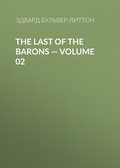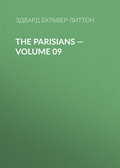
Эдвард Бульвер-Литтон
"My Novel" — Complete
CHAPTER VII
That evening Harley L’Estrange arrived at his father’s house. The few years that had passed since we saw him last had made no perceptible change in his appearance. He still preserved his elastic youthfulness of form, and singular variety and play of countenance. He seemed unaffectedly rejoiced to greet his parents, and had something of the gayety and tenderness of a boy returned from school. His manner to Helen bespoke the chivalry that pervaded all the complexities and curves of his character. It was affectionate, but respectful,—hers to him, subdued, but innocently sweet and gently cordial. Harley was the chief talker. The aspect of the times was so critical that he could not avoid questions on politics; and, indeed, he showed an interest in them which he had never evinced before. Lord Lansmere was delighted.
“Why, Harley, you love your country after all?”
“The moment she seems in danger, yes!” replied the Patrician; and the Sybarite seemed to rise into the Athenian. Then he asked with eagerness about his old friend Audley; and, his curiosity satisfied there, he inquired the last literary news. He had heard much of a book lately published. He named the one ascribed by Parson Dale to Professor Moss; none of his listeners had read it.
Harley pished at this, and accused them all of indolence and stupidity, in his own quaint, metaphorical style. Then he said, “And town gossip?”
“We never hear it,” said Lady Lansmere.
“There is a new plough much talked of at Boodle’s,” said Lord Lansmere.
“God speed it. But is not there a new man much talked of at White’s?”
“I don’t belong to White’s.”
“Nevertheless, you may have heard of him,—a foreigner, a Count di Peschiera.”
“Yes,” said Lord Lansmere; “he was pointed out to me in the Park,—a handsome man for a foreigner; wears his hair properly cut; looks gentlemanlike and English.”
“Ah, ah! He is here then!” and Harley rubbed his hands.
“Which road did you take? Did you pass the Simplon?”
“No; I came straight from Vienna.”
Then, relating with lively vein his adventures by the way, he continued to delight Lord Lansmere by his gayety till the time came to retire to rest. As soon as Harley was in his own room his mother joined him.
“Well,” said he, “I need not ask if you like Miss Digby? Who would not?”
“Harley, my own son,” said the mother, bursting into tears, “be happy your own way; only be happy, that is all I ask.”
Harley, much affected, replied gratefully and soothingly to this fond injunction. And then gradually leading his mother on to converse of Helen, asked abruptly, “And of the chance of our happiness,—her happiness as well as mine,—what is your opinion? Speak frankly.”
“Of her happiness there can be no doubt,” replied the mother, proudly. “Of yours, how can you ask me? Have you not decided on that yourself?”
“But still it cheers and encourages one in any experiment, however well considered, to hear the approval of another. Helen has certainly a most gentle temper.”
“I should conjecture so. But her mind—”
“Is very well stored.”
“She speaks so little—”
“Yes. I wonder why? She’s surely a woman!”
“Pshaw,” said the countess, smiling in spite of herself.
“But tell me more of the process of your experiment. You took her as a child, and resolved to train her according to your own ideal. Was that easy?”
“It seemed so. I desired to instil habits of truth: she was already by nature truthful as the day; a taste for Nature and all things natural: that seemed inborn; perceptions of Art as the interpreter of Nature: those were more difficult to teach. I think they may come. You have heard her play and sing?”
“NO.”
“She will surprise you. She has less talent for drawing; still, all that teaching could do has been done,—in a word, she is accomplished. Temper, heart, mind,—these all are excellent.” Harley stopped, and suppressed a sigh. “Certainly I ought to be very happy,” said he; and he began to wind up his watch.
“Of course she must love you,” said the countess, after a pause. “How could she fail?”
“Love me! My dear mother, that is the very question I shall have to ask.”
“Ask! Love is discovered by a glance; it has no need of asking.”
“I have never discovered it, then, I assure you. The fact is, that before her childhood was passed, I removed her, as you may suppose, from my roof. She resided with an Italian family near my usual abode. I visited her often, directed her studies, watched her improvement—”
“And fell in love with her?”
“Fall is such a very violent word. No; I don’t remember to have had a fall. It was all a smooth inclined plane from the first step, until at last I said to myself, ‘Harley L’Estrange, thy time has come. The bud has blossomed into flower. Take it to thy breast.’ And myself replied to myself, meekly, ‘So be it.’ Then I found that Lady N——-, with her daughters, was coming to England. I asked her Ladyship to take my ward to your house. I wrote to you, and prayed your assent; and, that granted, I knew you would obtain my father’s. Iam here,—you give me the approval I sought for. I will speak to Helen to-morrow. Perhaps, after all, she may reject me.”
“Strange, strange! you speak thus coldly, thus lightly, you, so capable of ardent love!”
“Mother,” said Harley, earnestly, “be satisfied! I am! Love as of old, I feel, alas! too well, can visit me never more. But gentle companionship, tender friendship, the relief and the sunlight of woman’s smile, hereafter the voices of children,—music that, striking on the hearts of both parents, wakens the most lasting and the purest of all sympathies,—these are my hope. Is the hope so mean, my fond mother?”
Again the countess wept, and her tears were not dried when she left the room.
CHAPTER VIII
Oh, Helen, fair Helen,—type of the quiet, serene, unnoticed, deep-felt excellence of woman! Woman, less as the ideal that a poet conjures from the air, than as the companion of a poet on the earth! Woman, who, with her clear sunny vision of things actual, and the exquisite fibre of her delicate sense, supplies the deficiencies of him whose foot stumbles on the soil, because his eye is too intent upon the stars! Woman, the provident, the comforting, angel whose pinions are folded round the heart, guarding there a divine spring unmarred by the winter of the world! Helen, soft Helen, is it indeed in thee that the wild and brilliant “lord of wantonness and ease” is to find the regeneration of his life, the rebaptism of his soul? Of what avail thy meek prudent household virtues to one whom Fortune screens from rough trial; whose sorrows lie remote from thy ken; whose spirit, erratic and perturbed, now rising, now falling, needs a vision more subtle than thine to pursue, and a strength that can sustain the reason, when it droops, on the wings of enthusiasm and passion?
And thou, thyself, O nature, shrinking and humble, that needest to be courted forth from the shelter, and developed under the calm and genial atmosphere of holy, happy love—can such affection as Harley L’Estrange may proffer suffice to thee? Will not the blossoms, yet folded in the petal, wither away beneath the shade that may protect them from the storm, and yet shut them from the sun? Thou who, where thou givest love, seekest, though meekly, for love in return; to be the soul’s sweet necessity, the life’s household partner to him who receives all thy faith and devotion,—canst thou influence the sources of joy and of sorrow in the heart that does not heave at thy name? Hast thou the charm and the force of the moon, that the tides of that wayward sea shall ebb and flow at thy will? Yet who shall say, who conjecture how near two hearts can become, when no guilt lies between them, and time brings the ties all its own? Rarest of all things on earth is the union in which both, by their contrasts, make harmonious their blending; each supplying the defects of the helpmate, and completing, by fusion, one strong human soul! Happiness enough, where even Peace does but seldom preside, when each can bring to the altar, if not the flame, still the incense. Where man’s thoughts are all noble and generous, woman’s feelings all gentle and pure, love may follow if it does not precede; and if not, if the roses be missed from the garland, one may sigh for the rose, but one is safe from the thorn.
The morning was mild, yet somewhat overcast by the mist which announces coming winter in London, and Helen walked musingly beneath the trees that surrounded the garden of Lord Lansmere’s house. Many leaves were yet left on the boughs; but they were sere and withered. And the birds chirped at times; but their note was mournful and complaining. All within this house, until Harley’s arrival, had been strange and saddening to Helen’s timid and subdued spirits. Lady Lansmere had received her kindly, but with a certain restraint; and the loftiness of manner, common to the countess with all but Harley, had awed and chilled the diffident orphan. Lady Lansmere’s very interest in Harley’s choice, her attempts to draw Helen out of her reserve, her watchful eyes whenever Helen shyly spoke or shyly moved, frightened the poor child, and made her unjust to herself.
The very servants, though staid, grave, and respectful, as suited a dignified, old-fashioned household, painfully contrasted the bright welcoming smiles and free talk of Italian domestics. Her recollections of the happy, warm Continental manner, which so sets the bashful at their ease, made the stately and cold precision of all around her doubly awful and dispiriting. Lord Lansmere himself, who did not as yet know the views of Harley, and little dreamed that he was to anticipate a daughter-in-law in the ward, whom he understood Harley, in a freak of generous romance, had adopted, was familiar and courteous, as became a host; but he looked upon Helen as a mere child, and naturally left her to the countess. The dim sense of her equivocal position, of her comparative humbleness of birth and fortunes, oppressed and pained her; and even her gratitude to Harley was made burdensome by a sentiment of helplessness. The grateful long to requite. And what could she ever do for him?
Thus musing, she wandered alone through the curving walks; and this sort of mock-country landscape—London loud, and even visible, beyond the high gloomy walls, and no escape from the windows of the square formal house—seemed a type of the prison bounds of Rank to one whose soul yearns for simple loving Nature.
Helen’s revery was interrupted by Nero’s joyous bark. He had caught sight of her, and came bounding up, and thrust his large head into her hand. As she stooped to caress the dog, happy at his honest greeting, and tears that had been long gathering at the lids fell silently on his face (for I know nothing that more moves us to tears than the hearty kindness of a dog, when something in human beings has pained or chilled us), she heard behind the musical voice of Harley. Hastily she dried or repressed her tears, as her guardian came up, and drew her arm within his own.
“I had so little of your conversation last evening, my dear ward, that I may well monopolize you now, even to the privation of Nero. And so you are once more in your native land?”
Helen sighed softly.
“May I not hope that you return under fairer auspices than those which your childhood knew?”
Helen turned her eyes with ingenuous thankfulness to her guardian, and the memory of all she owed to him rushed upon her heart.
Harley renewed, and with earnest, though melancholy sweetness, “Helen, your eyes thank me; but hear me before your words do. I deserve no thanks. I am about to make to you a strange confession of egotism and selfishness.”
“You!—oh, impossible!”
“Judge yourself, and then decide which of us shall have cause to be grateful. Helen, when I was scarcely your age—a boy in years, but more, methinks, a man at heart, with man’s strong energies and sublime aspirings, than I have ever since been—I loved, and deeply—”
He paused a moment, in evident struggle. Helen listened in mute surprise, but his emotion awakened her own; her tender woman’s heart yearned to console. Unconsciously her arm rested on his less lightly.
“Deeply, and for sorrow. It is a long tale, that may be told hereafter. The worldly would call my love a madness. I did not reason on it then, I cannot reason on it now. Enough: death smote suddenly, terribly, and to me, mysteriously, her whom I loved. The love lived on. Fortunately, perhaps, for me, I had quick distraction, not to grief, but to its inert indulgence. I was a soldier; I joined our armies. Men called me brave. Flattery! I was a coward before the thought of life. I sought death: like sleep, it does not come at our call. Peace ensued. As when the winds fall the sails droop, so when excitement ceased, all seemed to me flat and objectless. Heavy, heavy was my heart. Perhaps grief had been less obstinate, but that I feared I had causes for self-reproach. Since then I have been a wanderer, a self-made exile. My boyhood had been ambitious,—all ambition ceased. Flames, when they reach the core of the heart, spread, and leave all in ashes. Let me be brief: I did not mean thus weakly to complain,—I to whom Heaven has given so many blessings! I felt, as it were, separated from the common objects and joys of men. I grew startled to see how, year by year, wayward humours possessed me. I resolved again to attach myself to some living heart—it was my sole chance to rekindle my own. But the one I had loved remained as my type of woman, and she was different from all I saw. Therefore I said to myself, ‘I will rear from childhood some young fresh life, to grow up into my ideal.’ As this thought began to haunt me, I chanced to discover you. Struck with the romance of your early life, touched by your courage, charmed by your affectionate nature, I said to myself, ‘Here is what I seek.’ Helen, in assuming the guardianship of your ‘Life, in all the culture which I have sought to bestow on your docile childhood, I repeat, that I have been but the egotist. And now, when you have reached that age when it becomes me to speak, and you to listen; now, when you are under the sacred roof of my own mother; now I ask you, can you accept this heart, such as wasted years, and griefs too fondly nursed, have left it? Can you be, at least, my comforter? Can you aid me to regard life as a duty, and recover those aspirations which once soared from the paltry and miserable confines of our frivolous daily being? Helen, here I ask you, can you be all this, and under the name of—Wife?”
It would be in vain to describe the rapid, varying, indefinable emotions that passed through the inexperienced heart of the youthful listener as Harley thus spoke. He so moved all the springs of amaze, compassion, tender respect, sympathy, child-like gratitude, that when he paused and gently took her hand, she remained bewildered, speechless, overpowered. Harley smiled as he gazed upon her blushing, downcast, expressive face. He conjectured at once that the idea of such proposals had never crossed her mind; that she had never contemplated him in the character of wooer; never even sounded her heart as to the nature of such feelings as his image had aroused.
“My Helen,” he resumed, with a calm pathos of voice, “there is some disparity of years between us, and perhaps I may not hope henceforth for that love which youth gives to the young. Permit me simply to ask, what you will frankly answer, Can you have seen in our quiet life abroad, or under the roof of your Italian friends, any one you prefer to me?”
“No, indeed, no!” murmured Helen. “How could I; who is like you?” Then, with a sudden effort—for her innate truthfulness took alarm, and her very affection for Harley, childlike and reverent, made her tremble lest she should deceive him—she drew a little aside, and spoke thus,
“Oh, my dear guardian, noblest of all human beings, at least in my eyes, forgive, forgive me, if I seem ungrateful, hesitating; but I cannot, cannot think of myself as worthy of you. I never so lifted my eyes. Your rank, your position—”
“Why should they be eternally my curse? Forget them, and go on.”
“It is not only they,” said Helen, almost sobbing, “though they are much; but I your type, your ideal!—I?—impossible! Oh, how can I ever be anything even of use, of aid, of comfort to one like you!”
“You can, Helen—you can,” cried Harley, charmed by such ingenuous modesty. “May I not keep this hand?” And Helen left her hand in Harley’s, and turned away her face, fairly weeping.
A stately step passed under the wintry trees.
“My mother,” said Harley L’Estrange, looking up, “I present to you my future wife.”
CHAPTER IX
With a slow step and an abstracted air, Harley L’Estrange bent his way towards Egerton’s house, after his eventful interview with Helen. He had just entered one of the streets leading into Grosvenor Square, when a young man, walking quickly from the opposite direction, came full against him, and drawing back with a brief apology, recognized him, and exclaimed, “What! you in England, Lord L’Estrange! Accept my congratulations on your return. But you seem scarcely to remember me.”
“I beg your pardon, Mr. Leslie. I remember you now by your smile; but you are of an age in which it is permitted me to say that you look older than when I saw you last.”
“And yet, Lord L’Estrange, it seems to me that you look younger.”
Indeed, this reply was so far true that there appeared less difference of years than before between Leslie and L’Estrange; for the wrinkles in the schemer’s mind were visible in his visage, while Harley’s dreamy worship of Truth and Beauty seemed to have preserved to the votary the enduring youth of the divinities.
Harley received the compliment with a supreme indifference, which might have been suitable to a Stoic, but which seemed scarcely natural to a gentleman who had just proposed to a lady many years younger than himself.
Leslie renewed: “Perhaps you are on your way to Mr. Egerton’s. If so, you will not find him at home; he is at his office.”
“Thank you. Then to his office I must re-direct my steps.”
“I am going to him myself,” said Randal, hesitatingly. L’Estrange had no prepossessions in favour of Leslie from the little he had seen of that young gentleman; but Randal’s remark was an appeal to his habitual urbanity, and he replied, with well-bred readiness, “Let us be companions so far.”
Randal accepted the arm proffered to him; and Lord L’Estrange, as is usual with one long absent from his native land, bore part as a questioner in the dialogue that ensued.
“Egerton is always the same man, I suppose,—too busy for illness, and too firm for sorrow?”
“If he ever feel either, he will never stoop to complain. But, indeed, my dear lord, I should like much to know what you think of his health.”
“How! You alarm me!”
“Nay, I did not mean to do that; and pray do not let him know that I went so far. But I have fancied that he looks a little worn and suffering.”
“Poor Audley!” said L’Estrange, in a tone of deep affection. “I will sound him, and, be assured, without naming you; for I know well how little he likes to be supposed capable of human infirmity. I am obliged to you for your hint, obliged to you for your interest in one so dear to me.”
And Harley’s voice was more cordial to Randal than it had ever been before. He then began to inquire what Randal thought of the rumours that had reached himself as to the probable defeat of the Government, and how far Audley’s spirits were affected by such risks. But Randal here, seeing that Harley could communicate nothing, was reserved and guarded.
“Loss of office could not, I think, affect a man like Audley,” observed Lord L’Estrange. “He would be as great in opposition—perhaps greater; and as to emoluments—”
“The emoluments are good,” interposed Randal, with a half-sigh.
“Good enough, I suppose, to pay him back about a tenth of what his place costs our magnificent friend. No, I will say one thing for English statesmen, no man amongst them ever yet was the richer for place.”
“And Mr. Egerton’s private fortune must be large, I take for granted,” said Randal, carelessly.
“It ought to be, if he has time to look to it.”
Here they passed by the hotel in which lodged the Count di Peschiera.
Randal stopped. “Will you excuse me for an instant? As we are passing this hotel, I will just leave my card here.” So saying he gave his card to a waiter lounging by the door. “For the Count di Peschiera,” said he, aloud.
L’Estrange started; and as Randal again took his arm, said, “So that Italian lodges here; and you know him?”
“I know him but slightly, as one knows any foreigner who makes a sensation.”
“He makes a sensation?”
“Naturally; for he is handsome, witty, and said to be very rich,—that is, as long as he receives the revenues of his exiled kinsman.”
“I see you are well informed, Mr. Leslie. And what is supposed to bring hither the Count di Peschiera?”
“I did hear something, which I did not quite understand, about a bet of his that he would marry his kinsman’s daughter, and so, I conclude, secure to himself all the inheritance; and that he is therefore here to discover the kinsman and win the heiress. But probably you know the rights of the story, and can tell me what credit to give to such gossip.”
“I know this at least, that if he did lay such a wager, I would advise you to take any odds against him that his backers may give,” said L’Estrange, dryly; and while his lip quivered with anger, his eye gleamed with arch ironical humour.
“You think, then, that this poor kinsman will not need such an alliance in order to regain his estates?”
“Yes; for I never yet knew a rogue whom I would not bet against, when he backed his own luck as a rogue against Justice and Providence.”
Randal winced, and felt as if an arrow had grazed his heart; but he soon recovered.
“And indeed there is another vague rumour that the young lady in question is married already—to some Englishman.” This time it was Harley who winced. “Good heavens! that cannot be true,—that would undo all! An Englishman just at this moment! But some Englishman of correspondent rank I trust, or at least one known for opinions opposed to what an Austrian would call Revolutionary doctrines?”
“I know nothing. But it was supposed merely a private gentleman of good family. Would not that suffice? Can the Austrian Court dictate a marriage to the daughter as a condition for grace to the father?”
“No,—not that!” said Harley, greatly disturbed. “But put yourself in the position of any minister to one of the great European monarchies. Suppose a political insurgent, formidable for station and wealth, had been proscribed, much interest made on his behalf, a powerful party striving against it; and just when the minister is disposed to relent, he hears that the heiress to this wealth and this station is married to the native of a country in which sentiments friendly to the very opinions for which the insurgent was proscribed are popularly entertained, and thus that the fortune to be restored may be so employed as to disturb the national security, the existing order of things,—this, too, at the very time when a popular revolution has just occurred in France, and its effects are felt most in the very land of the exile;—suppose all this, and then say if anything could be more untoward for the hopes of the banished man, or furnish his adversaries with stronger arguments against the restoration of his fortune? But pshaw! this must be a chimera! If true, I should have known of it.”
[As there have been so many revolutions in France, it may be convenient to suggest that, according to the dates of this story, Harley no doubt alludes to that revolution which exiled Charles X. and placed Louis Philippe on the throne.]
“I quite agree with your lordship,—there can be no truth in such a rumour. Some Englishman, hearing, perhaps, of the probable pardon of the exile, may have counted on an heiress, and spread the report in order to keep off other candidates. By your account, if successful in his suit, he might fail to find an heiress in the bride.”
“No doubt of that. Whatever might be arranged, I can’t conceive that he would be allowed to get at the fortune, though it might be held in suspense for his children. But indeed it so rarely happens that an Italian girl of high name marries a foreigner that we must dismiss this notion with a smile at the long face of the hypothetical fortune-hunter. Heaven help him, if he exist!”
“Amen!” echoed Randal, devoutly.
“I hear that Peschiera’s sister is returned to England. Do you know her too?”
“A little.”
“My dear Mr. Leslie, pardon me if I take a liberty not warranted by our acquaintance. Against the lady I say nothing. Indeed, I have heard some things which appear to entitle her to compassion and respect. But as to Peschiera all who prize honour suspect him to be a knave,—I know him to be one. Now, I think that the longer we preserve that abhorrence for knavery which is the generous instinct of youth, why, the fairer will be our manhood, and the more reverend our age. You agree with me?” And Harley suddenly turning, his eyes fell like a flood of light upon Randal’s pale and secret countenance.
“To be sure,” murmured the schemer.
Harley, surveying him, mechanically recoiled, and withdrew his arm.
Fortunately for Randal, who somehow or other felt himself slipped into a false position, he scarce knew how or why, he was here seized by the arm; and a clear, open, manly voice cried, “My dear fellow, how are you? I see you are engaged now; but look into my rooms when you can, in the course of the day.”
And with a bow of excuse for his interruption to Lord L’Estrange, the speaker was then turning away, when Harley said,
“No, don’t let me take you from your friend, Mr. Leslie. And you need not be in a hurry to see Egerton; for I shall claim the privilege of older friendship for the first interview.”
“It is Mr. Egerton’s nephew Frank Hazeldan.”
“Pray, call him back, and present me to him. He has a face that would have gone far to reconcile Timon to Athens.” Randal obeyed, and after a few kindly words to Frank, Harley insisted on leaving the two young men together, and walked on to Downing Street with a brisker step.







